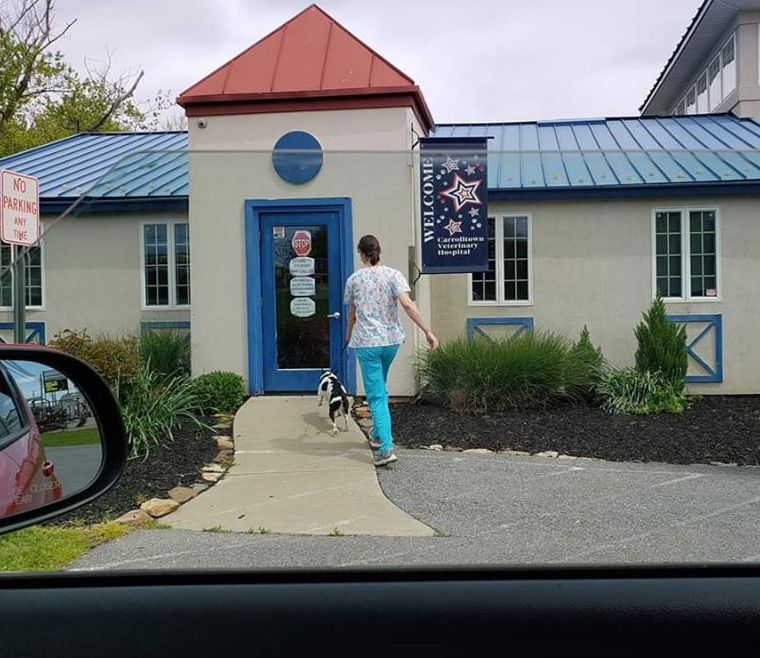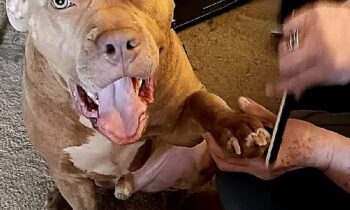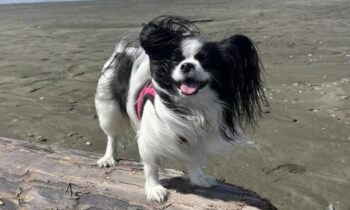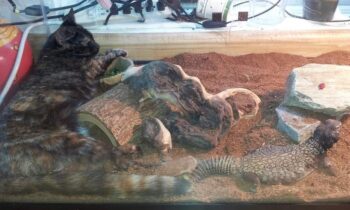
One of the biggest challenges for pet owners during the coronavirus quarantine/lockdown has been not being able to accompany their animals for care at veterinary clinics. Instead, humans are asked to wait in their vehicles while a vet tech or other staffer comes out to take the animal inside.
Most dogs had never experienced a veterinary visit where they could not be accompanied by their humans, and most humans had no idea how their dogs would react. Not well, many expected.
I was curious if their dogs’ behavior might surprise some owners hearing about it from other “witnesses” present for a dog’s veterinary care or grooming. I learned from veterinarians that they could usually tell which dogs were used to humans wearing masks. I wondered what else professionals in pet care could tell about our animals and us when we owners weren’t there!
Summer Storm Kingery DVM (North Carolina) I’m amazed at how many dogs who are incredibly reactive with their owners present are much more receptive (not frozen, not cringeing) in this situation. Also, that some dogs who are fearful will use whoever brings them in as a surrogate.
Sarah Adams (Oregon) If it’s somewhere like the vet, where other people are interacting with them, [my dogs] wiggle and lick everyone in sight. I thought Pirate might care with his vet visit, since he hadn’t even been to this vet before, but he ran in without a backward glance, and was so happy to be there, he didn’t even limp. Which is what we were there for! Vet probably thought I was crazy. But he liked my dog. He said he wished all his patients were “difficult” like this.
Debby McMullen (Pennsylvania) Kenzo is very social so he does great with being away from me inside of the vet clinic. My dogs are used to seeing me wear a mask when I exit the car for the store. We have also had service people in our home with them and me wearing masks, and Kenzo is also fine with that. Mela is not social so she could not go into the vet’s without me, but she actually did pretty well when we went in and everyone was wearing masks—until I tried to put a mask (muzzle) on her. That’s normal for her. It did exhaust her to have my friend and his friend doing some electrical work for me when we all had masks on.
Sherry Al-Mufti (California) Jacques is chill when I am not around, which is surprising since we have been pretty much joined at the hip since I brought him home. However, I learned from a friend with whom I travel a lot that when I leave our hotel room he goes quietly to the door and lies there calmly until I return. I was touched.
Mary Tichenor (Wisconsin) Mine didn’t seem to care at all [at the vet clinic]. They did not come back panting or fearful.
Donna Weidert (Washington) Prince went to the vet once before the restrictions were lifted, and once to the groomer since lifting. He trotted right after the vet tech to the door while I waited in the car. Didn’t seem bothered. My groomer said he was “the perfect gentleman, just like always” when I asked how he’d done. He is 13 and I think he is pretty chill about most all the world now. He has lost his hearing in the last year or so, but he’s always been pretty easygoing—for a stubborn terrier, that is.
Amy Suggars (Ohio) KD had to go in for a heartworm test (to get her prescription). She blithely went off into the clinic with the tech and didn’t look back! The tech said she wagged her tail the whole time she was with them! She also complimented me on KD’s training, saying that she listened to them well!
Erin Saywell (Maryland) I’ve been to the vet way too many times during this pandemic, and all of our dogs have gotten good report cards.
My dog Surplus here [in the photo below] literally pulled the tech inside—didn’t even glance back at me. LOL!

Photo by Erin Saywell
Timothy Page (Oregon) The vet has paid for at least two of Lalo’s leashes that they let him chew up. He never does this except at the vet. Both Chiquis and Lalo want to run away as we approach the door. Coco loves everyone, even everyone at the vet’s. They tell me he doesn’t mind getting injections. Is he weird?
Marie Hammerling (Florida) Hershey, a pekepom, is fine at the vet. However, our cat Sophie is another story. She yells and make such noise when she’s in the back room at the vet that they joke and say she’s cursing.
Kristi Hanson (Louisiana) I am in rehab for a broken leg. I first was in the hospital for about ten days. I’ve been in rehab for six weeks now. When Gigi was at home alone, her caretakers said when they would go to feed her, they would try to get her to come to them, but she refused to get close to them. She would trot around and around in circles and hide and shake. Circling is her biggest defense mechanism. It’s also her biggest happiness indicator. It all depends on her demeanor. Since my friends have been bringing her for visits with me, she has been much friendlier and actually greets them and seems happy to see them.
Jenny Julian (Oregon) I have taken many other dogs to the vet during COVID-19 with no issues. But one of my foster dogs was fearful. He’d suffered medical neglect and was in misery. He had no human aggression at home, no matter all we had to do to treat his severe skin infection, but he became vet-aggressive and required a muzzle. I hope it doesn’t affect him forever.
Linda D. Keast (Oregon) Lili, my stalwart heart-of-a-lion 14-year-old papillon was trembling before I got out the groomer’s door. The groomer called me about 45 minutes later and told me in a frightened voice that she thought Lili was having a seizure—heavy panting, peeing on the table, snapping—and I should come get her and take her to the vet. I was there within five minutes. Lili had calmed down a bit but was still panting heavily. By the time I got her home, she was back to normal. This is a groomer we’ve used at least three times before and who is experienced with small dogs. I should mention that it was about two months after Lili had TPLO surgery, which heightened her concern about (a) vets and people who might be vets, and (b) my leaving her alone.
Christine Hale Vertucci (Illinois) I brought Omar to the vet this week because he hadn’t been feeling well, to evaluate a few lumps, and to get his heartworm test and parvo/distemper titers. I’ve done all of his handling for vet visits since he was a puppy; he’s now eight years old. My 109-pound Rottweiler, who does not make friends indiscriminately, was a rockstar for a blood draw, aspiration of lump, ultrasound of his abdomen, close examination of his paws (he has a painful condition that makes his nails break and fall off) and general exam without me. I don’t know whether I should be proud of him or disappointed in myself for not trusting him in the past. I’m sure it helped that he was examined by the veterinarian who has seen him several times and whom Omar has admitted to his “circle.”
Marilyn Marks (Connecticut) I always ask for behavior specifics when leaving my dog in care of groomer, daycare, etc. Now that includes vets, too, as we have to stay out of the office because of COVID. The knowledge lets me evaluate even more than these caretakers can imagine, and also tells me if I have a dog who has more fears or anxieties than I usually see in daily life . . . which I can then work on.
Yes, you should ask your veterinarian and the clinic staff, your groomer, the daycare worker, “How did my dog behave when she was with you, when I wasn’t there?”
Encourage more than a casual answer! Get some details. Did she walk willingly, was he eager to escape, how was she “on the table,” did he take treats? You may not get a long conversation—it’s a frantic time right now—but do ask and do remember to thank staffers for their input.
Use what you learn to plan your next visit so it can be even easier on you and on your pet. Address the issues you can, and get the help you need to deal with any behavior that you hope to change. Your pet (and your vet!) will thank you.



